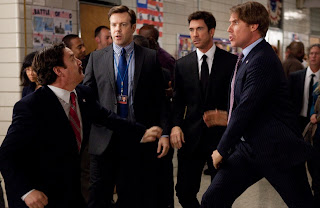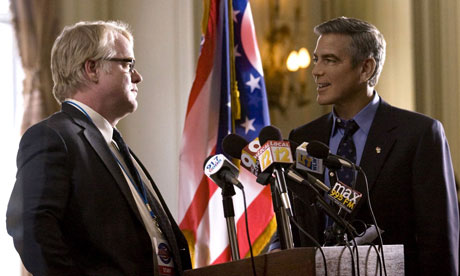“The Campaign” didn’t necessarily need to exist. Jay Roach could have just shot footage of Will Ferrell and Zach Galifianakis together in the same room, and I still would have bought the ticket. However, the fact that “The Campaign” gives them a purpose makes it all the better.
At this point, political satire has nailed down all of the main points pretty well: politicians will do anything they can to win, and they will also take any excuse to label their opponents as Communists. But the devil is truly in the details, and the challenge is in finding ways to make stale jokes seem fresh. The best example might be when Cam Brady (Will Ferrell) accidentally punches a baby in the face. The baby punching isn’t the funniest part; the fact that the scene is played out in slow-motion really seals the deal. And here I thought that showing the clip on every single talk show would make it less funny in the actual movie.
At the beginning of “The Campaign,” Ferrell’s Brady is going around telling everyone from auto workers to Filipino amusement park ride operators that they are the “backbone of America.” Political junkies will be surprised by how well versed writers Chris Henchy and Shawn Harwell in American political jargon. This isn’t quite “The West Wing” penned by comedy writers (“Parks & Rec” and “Veep” are more in that league). It’s more like if “Step Brothers” focused on a bunch of Washington insiders. That is very high compliment.
I think this is my favorite performance that I have seen from Ferrell in quite a few years. He is in his element as a Ron Burgundy-type politician with less of a heart. Cam Brady is a congressman for a small district in North Carolina. His years in Washington have turned him into a corrupt womanizer. Despite a sex scandal involving a voicemail on the wrong person’s machine (to be far, who still uses an answering machine?), Brady runs totally unopposed.
In Washington, the Motch Brothers (which sounds an awful lot like Marx Brothers when said out loud), senior congressmen played by Dan Aykroyd and John Lithgow, look for a way to bring cheap, illegal Chinese labor to the Carolina district. Aykroyd plays a version of one of the men who made him homeless in “Trading Places.” How the tables have turned. The Motch Brothers’s plan is almost a cartoonishly evil plot. I could picture them coming up with this on Looney Tunes before getting blown up by some disguised dynamite.
The Motch Brothers decide their plan will succeed if they bring their own player into the race. They go with Marty Huggins (Galifianakis), who takes ‘inexplicable choice’ to a whole new level. Huggins, who is a variation of Galifianakis’s Seth Galifianakis, is the effeminate tourism director of Hammond. He knows many interesting facts about the town, such as the one regarding the time that Rosie Perez stopped in town because she needed to use the phone. They say people resemble their dogs, and Huggins is essentially a pug walking on its hind legs. His family, meanwhile, could have their own reality show. Galifianakis is a great comic actor because everything he does as Huggins perfectly fits the character right up to the way he runs, which can be better described as skipping with style.

 |
| The living embodiment of Awkward Family Photos. |







